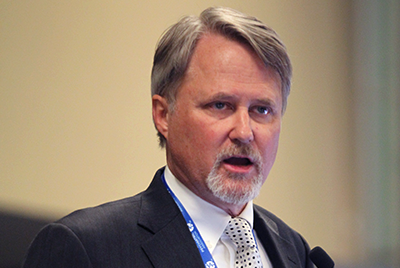Dangerousness, Not Mental Illness, Should Guide Gun Restrictions

Reducing death and injury by firearms should focus less on people who are mentally ill and more on reducing access to lethal means by individuals who want to harm themselves or others, according to Jeffrey Swanson, Ph.D. (pictured above), a professor of psychiatry and behavioral sciences at the Duke University School of Medicine in Durham, N.C.
There is only a tiny intersection between gun violence and mental illness, but the focus on that overlap expands after each mass shooting, said Swanson yesterday at APA’s 2016 Annual Meeting. “But that doesn’t square with the facts,” he said. “The population attributable risk for violence by people with mental illness is just 4 percent.”
The exception lies in the fact that two-thirds of gun deaths are suicides, and 47 percent to 74 percent of suicides are associated with mental illness. Reducing the annual toll of 33,000 firearms deaths means investing in research and advocacy for the long haul.
“There is no one solution, just a lot of pieces to a big puzzle,” said Swanson. Together with other researchers, he recommends a risk-based firearms policy, using behavioral indicators of risk of harm to self or others. This includes people with domestic violence restraining orders and people who have been arrested for drunken driving in the previous five years or with at least two recent drug offenses.
Connecticut initiated such a program in 1999, using the civil court system with a stated public health goal. A “risk warrant” must be approved by a judge based on probable cause of harm, and police officers are sent to remove the guns from the person’s possession. Most important, the action is not entered in a criminal record and is not permanent. The gun owner’s constitutional rights can be restored after due process and a clinical review.
“We need to bring evidence to bear on the question of gun violence,” he said. “We can’t prevent the next mass shooting, but maybe we can prevent the unpredictable through the use of measures like universal background checks, treating substance abuse, reducing the social determinants of violence.”
(Image: David Hathcox)
|
|
|
|
|


